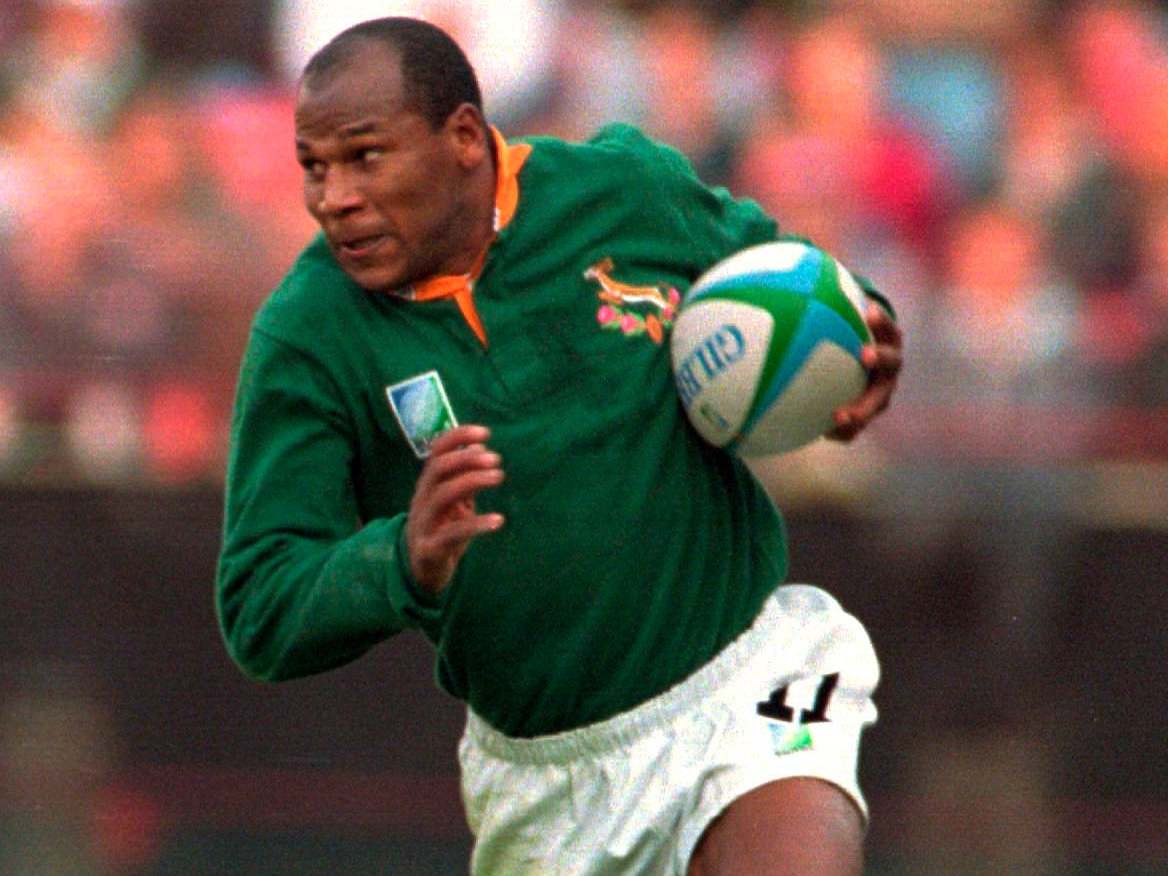Chester Williams: South African rugby star who symbolised the end of apartheid
He was the only non-white member of the country’s victorious 1995 Rugby World Cup team

Chester Williams was a standout rugby player and the only non-white member of the South African team that won the 1995 Rugby World Cup, an event celebrated at the time – however prematurely – as a symbol of racial harmony after decades of apartheid.
Williams, who has died of a heart attack aged 49, was a central figure in one of the most compelling sports dramas of the latter 20th century. The 1995 Rugby World Cup, which South Africa hosted after being barred from the two previous tournaments because of its oppressive white minority rule, assumed significance far beyond who won or lost on the field – although that mattered too, and the victory by the South African Springboks only added to the event’s mystique.
In a South African society brutally divided along racial lines, rugby was long considered a white sport, soccer a black one. Williams – who as a person of mixed race was considered “coloured”, as distinct from black, under the apartheid regime – had grown up playing rugby. His father and two uncles, including one who had played for the Springboks, had excelled in the sport.
In the early years of his career, Williams recalled changing his clothes on the bus because locker rooms were restricted to white athletes. He debuted with the Springboks in 1993, facing off with Argentina, and watched as apartheid fell the next year. When South Africa was selected to host the Rugby World Cup in 1995, president Nelson Mandela sought to win the goodwill of the Springboks’ white fans by throwing his support behind the team.
Williams, then in his twenties, appeared on billboards displayed in South Africa during the tournament, a major international event. An injury forced him to withdraw from the squad before the tournament began but, after another player was suspended for a brawl, Williams was called back for the quarter-final against Samoa: he scored four times.
The Springboks went on to defeat France before facing New Zealand in the final. Mandela, wearing a Springboks jersey and cap, visited the players in the locker room before they took the field. “We knew we had to go out there and win it for South Africa,” Williams said. “There were tears in my eyes. But some of the other guys were so moved they were openly crying. That this man who had suffered so much should forgive and want us to win was incredible. It was the only motivation we needed.”
The Springboks prevailed, 15-12, and a beaming Mandela presented the World Cup trophy to Francois Pienaar, the team’s Afrikaner captain, at Johannesburg’s Ellis Park Stadium. It was a poignant image, but one that obscured some still-festering racial sores, including among the rugby players. At times in his career, Williams had been the subject of insults, including from teammates. One taunted him with a racial slur and demanded of him: “Why do you want to play our game? You know you can’t play it.”
Four years after the World Cup, South African sports authorities ordered mandatory quotas for black players on the nation’s rugby teams because a policy of voluntary integration had been unsuccessful. At the 1999 World Cup, Williams was cut from the squad: he said he was told that the racial quota had been met.
“I was definitely not a product of any enlightened developmental system put in place to help black and coloured players,” he said in 2002. “I did it the hard way. I fought my way up through the ‘white’ system on merit. I am a rugby player, pure and simple, that is my story.”
Chester Mornay Williams was born in Paarl, 40 miles east of Cape Town, in 1970. The area was the site of vigorous anti-apartheid protests, one in which his best friend was killed. He started playing rugby at the age of eight, stopped when he was 12 and resumed at 18.
He worked for the South African military while beginning his rugby career. He was named player of the year in 1994 and appeared in his final test with the Springboks against Wales in 2000. He later pursued a coaching career in South Africa and elsewhere on the continent, leading the national teams of Uganda and Tunisia.
He is survived by his wife Maria and three children.
Chester Williams, rugby player, born 8 August 1970, died 6 September 2019
© Washington Post
Subscribe to Independent Premium to bookmark this article
Want to bookmark your favourite articles and stories to read or reference later? Start your Independent Premium subscription today.

Join our commenting forum
Join thought-provoking conversations, follow other Independent readers and see their replies